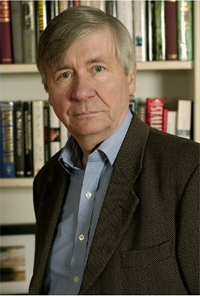Great Throughts Treasury
This site is dedicated to the memory of Dr. Alan William Smolowe who gave birth to the creation of this database.

Herbert Read, fully Sir Herbert Edward Read
English Poet, Critic, Anarchist, Critic of Literature and Art
"The sense of historical continuity, and a feeling for philosophical rectitude cannot, however, be compromised."
"The worth of a civilization or a culture is not valued in the terms of its material wealth or military power, but by the quality and achievements of its representative individuals - its philosophers, its poets and its artists."
"There are a few people, but a diminishing number, who still believe that Marxism, as an economic system, off era a coherent alternative to capitalism, and socialism has, indeed, triumphed in one country."
"These groups within a society can he distinguished according as to whether, like an army or an orchestra, they function as a single body; or whether they are united merely to defend their common interests and otherwise function as separate individuals."
"To realize that new world we must prefer the values of freedom and equality above all other values - above personal wealth, technical power and nationalism."
"The sensitive artist knows that a bitter wind is blowing."
"The slave may be happy, but happiness is not enough."
"There is a current misconception which sees in Jung an early disciple of Freud who subsequently deserted his master. Nothing could be more misleading. From the very beginning there were differences of procedure and of outlook that were bound to lead to divergent results. Freud's work is based on a scientific method restricted to the principle of causality: that is to say, it is assumed that everything that happens has an explanation in prior causes, and is merely the result of those causes. The world is a mechanism that can be taken to pieces and we can only understand how it works if we know how to dismantle and reassemble its constituent parts. Jung does not deny this causal principle, but he says it is inadequate to explain all the facts. In his view, we live and work, day by day, according to the principle of directed aim or purpose, as well as by the principle of causality. We are drawn onwards and our actions are significant for a future we cannot foresee, and will only be explicable when the final effect of the impulse becomes evident. In other words, life has a meaning as well as an explanation; a meaning, moreover, that we can never finally discover, for it is being extended all the time by the process of evolution."
"This is the essential distinction--even opposition--between the painting and the film: the painting is composed subjectively, the film objectively. However highly we rate the function of the scenario writer--in actual practice it is rated very low--we must recognize that the film is not transposed directly and freely from the mind by means of a docile medium like paint, but must be cut piece-meal out of the lumbering material of the actual visible world."
"We may be sure that out of the ruins of our capitalist civilization a new religion will emerge, just as Christianity emerged from the ruins of the Roman civilization."
"What I do deny is that you can build any enduring society without some such mystical ethos."
"We must always distinguish two faculties in the life of man: intellect and sensibility. Intellect begins with the observation of nature, proceeds to memorize and classify the facts thus observed, and by logical deduction builds up that edifice of knowledge properly called science. Sensibility, on the other hand, is a direct and particular reaction to the separate and individual nature of things. It begins and ends with the sensuous apprehension of color, texture and formal relations; and if we strive to organize these elements, it is not with the idea of increasing the knowledge of the mind, but rather in order to intensify the pleasure of the senses. But admittedly we also know by feeling, and we can combine the two faculties, and present knowledge in the guise of art."
"Whilst Marx turned the Hegelian dialectic outwards, making it an instrument with which he could interpret the facts of history and so arrive at an objective science which insists on the translation of theory into action, Kierkegaard, on the other hand, turned the same instruments inwards, for the examination of his own soul or psychology, arriving at a subjective philosophy which involved him in the deepest pessimism and despair of action."
"Works of art must persist as objects of contemplation."
"You might think that it would he the natural desire of every man to develop as an independent personality, but this does not seem to be true."